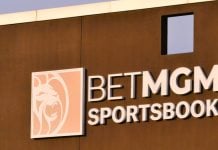With the sports betting world still awaiting a final decision from SCOTUS on PASPA in the United States, SBC Americas revisited some key observations aired by three of the industry’s foremost thinkers during this year’s Betting on Football Conference event in London.
Speaking on a special panel titled USA – Making America Great Again were Paris Smith, CEO of Pinnacle; Robin Roy, Director of Sales North America Sportradar; and Mark Blandford, founder of Sportingbet, with David Sargeant of iGaming Ideas as moderator. Between them they explored some of the myriad possibilities that might emerge from a regulated sports betting sector and some of the hurdles operators may have to overcome en route to market entry.
While hesitant to predict exactly how the SCOTUS decision will take shape ie full, partial or no repeal, Roy did throw an alternative outcome into the mix. “There is a fourth possibility as well,” he told delegates. “It’s very little talked about and it probably will not happen but it is a possibility. And that is that the Supreme Court could come back with a decision saying that the grandfathering (of other states) was unconstitutional and illegal and just wipe out sports betting altogether in the US. It’s very, very unlikely but it is a fourth possibility.”
He added: “If you go along the merits of the case, what New Jersey is arguing is that it’s a state’s right – that it’s not fair that four other states get to have sports betting and they do not. So, going along those states’ rights, I find it unlikely that a partial decision would come back where only New Jersey gets it. I would think that if the court is going specifically on states’ rights it would either be a full repeal or upholding PASPA.”
Blandford, offering his view of how SCOTUS might rule, stated: “Through a number of touchpoints and my involvement in a company called FSB Technology we were of the opinion that a partial repeal was the most likely outcome. A full repeal was the second most likely outcome and other options we’ve touched upon are, quite frankly, 33 to one shots.”
Smith adopted a slightly different line, saying: “There are so many different components that are going to be tied to this. If you’re looking at when is the Supreme Court going to do something that’s easier because they have a timeline. The time to market – that’s what’s most interesting to me. Everybody is panicking saying we have to be ready by football next season and that we have to have everything done – we’re hiring all these people. But there are so many components that will be put into play. I think it’s going to take a little more time than what’s previously been anticipated.”

Mark Blandford – a partial repeal is the most likely outcome
A recurring question in the debate is which state will win the race to be the first outside Nevada to be fully up and running with a regulated sports betting sector. According to Blandford, that will depend on the regulatory process and the speed at which it works. “I guess we’ve got to be thinking about New Jersey and Pennsylvania who’ve got bills ready to go off the back of a full or partial repeal,” he advised. “They’d be among the favourites in my book.”
Roy concurred that New Jersey is a favourite. “It could be a partial repeal and they would be the only ones guaranteed to have it then,” he said. “There are states that do have laws signed now including Connecticut and West Virginia. Mississippi is an interesting case in that they believe that they don’t need an overturn of PASPA in order to operate. They believe that they have state law that allows them now to operate and they have been moving in that direction.”
The panel also considered the various routes to market, with Smith leading the discussion. “I think right now that collaboration is the only way,” she remarked. “You have to have a link to somebody who has already invested capital. Casino companies and horse race tracks have contributed hundreds of billions of dollars in investment. Whomever on the sports betting side wants to come into the market will have to have some form of strategic alliance with these groups.”
Roy’s view focused on a potential knowledge gap in the States. “You have in the US casinos and racetracks that have little to no betting experience, so what they’re looking for are turnkey solutions from someone that can come in and do absolutely everything. And partnerships are key to be able to come in and do that.
“Licensing is going to be a really big hurdle to a lot of operators coming in. The licensing process in each one of these states is going to be really invasive. It’s very expensive, it’s very time consuming. Each company director, anyone who owns five per cent or more of company stock, has to be personally investigated for personal finances, not just company finances. A lot of people are going to be turned off by the process – they may think it’s not worth it and some people may not make it through the process.”
Blandford responded: “I’d like to add a point here relating to the strength of British and European operators. Speaking from a British perspective we’ve had a history of a legal and regulated bookmaking industry. What does that mean? That means our risk management knowledge and tools and techniques have been allowed to develop and mature. There are a tiny number of risk managers operating out of Nevada who know anything about sports and their perspective, in my opinion, is slightly different anyway.
“The US will need the know-how, so this is what gives us (British/Europeans) the real opportunity to go into the American market because their risk management techniques, quite frankly, are very simplistic. And smart professional punters from around the world are going to tear into them if they’re allowed to get a bet on.”
The panel concluded with a final question seeking a prediction on who would be the biggest brand in sports betting in the US. Roy answered: “I believe the big casino chains have a head start on everybody. They will have the operations in-house. They have got the branding already there.The largest operators in terms of numbers of casinos are Caesar’s and MGM, Boyd and Penn National. I would imagine those companies have the best chance.”
Blandford disagreed. “I think the kind of corporate, cultural change the bricks and mortar casinos need to go through to become the dominant brands is going to be a big ask,” he argued. “They will have to adapt massively for that to come true. I’m not sure they can. I do believe that you could see European operators setting up coming under the regulatory regime. I’m not saying they couldn’t be supplying services and technology to those bricks and mortar casinos – I absolutely expect it to happen. But I’m not sure that there might not be somebody who does try to go it alone with their own brand which is not an existing US brand today.”
SBC’s next major event is the Betting on Sports Conference, which runs on 18-20 September 2018 at London’s Olympia. #BOSCON2018 will have a whole track dedicated to the US and beyond on day 2 of the conference. For more information, click here.














